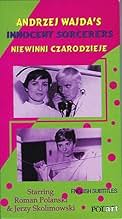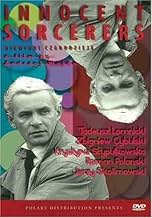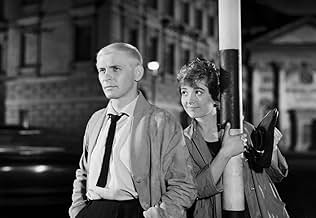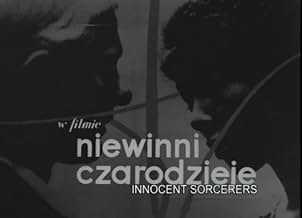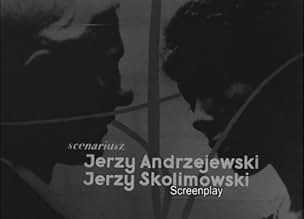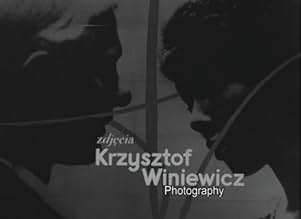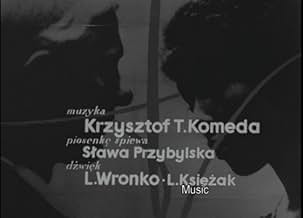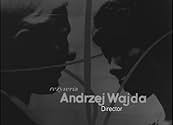NOTE IMDb
7,3/10
1,7 k
MA NOTE
Ajouter une intrigue dans votre langueA womanizer is tired of being sought by women. One night he meets a young girl who all but forces herself into his room, where they talk of morals and love.A womanizer is tired of being sought by women. One night he meets a young girl who all but forces herself into his room, where they talk of morals and love.A womanizer is tired of being sought by women. One night he meets a young girl who all but forces herself into his room, where they talk of morals and love.
- Réalisation
- Scénario
- Casting principal
Marian Kociniak
- Guest
- (non crédité)
Krzysztof Komeda
- Self
- (non crédité)
Henryk Kurek
- A Man in the Group
- (non crédité)
Slawa Przybylska
- Self
- (non crédité)
Jerzy Skolimowski
- Boxer
- (non crédité)
Andrzej Trzaskowski
- Self
- (non crédité)
Avis à la une
Niewinni Czarodzieje (Innocent Sorcerers), a movie made in 1960, gathering some of the greatest names of Polish cinema: director was Andrzej Wajda; Jerzy Andrzejewski (the author of Ashes and Diamonds, the novel on which the homonym film was based) created here the screenplay, together with Jerzy Skolimowski (who also had a cameo); the music was composed by Krzysztof Komeda (who also scored some of the first movies of Polanski); you will recognize in the cast Zbigniew Cybulski and Roman Polanski; the lead characters were played by Tadeusz Lomnicki and Krystyna Stypulkowska. It's a feast to see them all, time will go and each one will follow a different path, here they are together, in their young years, these legends of the film universe.
I saw the movie for the first time by the end of the sixties. I was very young, and I liked Polish movies very much. This one took me totally by surprise, as I was expecting something different. I realized it was a movie with heroes of my generation, people in their twenties (now we are the baby-boomers of late sixties). However, the plot came to me as a non-issue. I was a fan of Polish movies, and I loved the films of Wajda and Kawalerowicz. This one was not that kind. And it was directed by Wajda! Actually this movie is stamped Skolimowski! The director was indeed Wajda, but he played faithfully the hand of his scriptwriter. Michael Open (who reviewed the movie for IMDb) says it bluntly: the creative force is here Skolimowski, not Wajda. Innocent Sorcerers is hundred percent New Wave, and by that time I wasn't familiarized at all with this current.
It looks quirky and it looks cynical, because that's the way New Wave looks like. Quirky because it throws away some respected cinematic conventions (and not only cinematic), and cynical, because it doesn't believe in the system, be it political system, be it any other blah-blah system.
I watched again Innocent Sorcerers recently, on youTube. Years have passed and I saw many great movies of the New Wave. This time I understood it, and I had a feeling of nostalgia, just because of that. A movie made when my generation was in the twenties, with heroes of that age, with mentalities of that age, speaking to the person I was at that age, no more to the person I am now.
So the movie made me a bit nostalgic. In the same time, I was charmed. I had been hundred percent wrong when watching it first time. It's far from being a non-issue. This film is perfect, and watching it brings something like organic satisfaction: such an artwork comes as naturally as air or water.
Maybe the title was translated in Romanian more appropriately than it was in English: Inocentii fermecatori, it could mean Innocent Charmers, also Charming Innocents. Charmers is more fit than Sorcerers: this movie is superbly ambiguous beginning with its title. It also is ambiguous beginning with the beginning: the very first scene shows a woman passing the street and leaving behind huge posters of this movie! So, is Niewinni Czarodzieje (Innocent Sorcerers, or Innocent Charmers, whatever) a movie about itself? For Krystyna Stypulkowska, the female lead, it was her first movie. She would play only in two more films. I looked for further information, without success. Well, she played here amazingly, the perfect charmer who never let you tell what's behind the charm, the good and the evil, who never let you know where she came from and where will she go.
The title of the movie comes from a masterpiece of Polish literature: Dziady (Forefathers'Eve), the poetic drama created by Adam Mickiewicz. It's a line in the first part of Dziady that names the niewinni młodzi czarodzieje (innocent young charmers) who własne swe nadzieje (poison their own hopes).
Dziady has four parts, very loosely related, each one created by Mickiewicz in a different period of life. The first part follows the sentimental tribulations of a young couple, confused about the path to take in their relationship: the innocent charmers who burn their own hopes. But it's not only the first part: love comes as an important theme in the whole poem. Dziady is about Polish ethos, both individual and collective. Giving and returning love is viewed by Mickiewicz as essential for the salvation of that ethos: individual and national. While keeping on the innocent charm level will poison hope and ultimately life: personal life and national life.
Coming back to the movie, there is a scene by the end in which the main hero asks someone on the street what is over Faith and Hope. Love, comes the answer. It's a quote from I Corinthians 13, and it gives us the clue: this movie is a replica to the first part of Dziady, played in our epoch. The innocent young charmers must recognize and assume their love, to not burn hope.
The movie was made in 1960. In 1968 Dziady will come once again in the picture: a representation of the poem will be forbidden, which will bring the Polish students on the streets, against the Communist regime.
I saw the movie for the first time by the end of the sixties. I was very young, and I liked Polish movies very much. This one took me totally by surprise, as I was expecting something different. I realized it was a movie with heroes of my generation, people in their twenties (now we are the baby-boomers of late sixties). However, the plot came to me as a non-issue. I was a fan of Polish movies, and I loved the films of Wajda and Kawalerowicz. This one was not that kind. And it was directed by Wajda! Actually this movie is stamped Skolimowski! The director was indeed Wajda, but he played faithfully the hand of his scriptwriter. Michael Open (who reviewed the movie for IMDb) says it bluntly: the creative force is here Skolimowski, not Wajda. Innocent Sorcerers is hundred percent New Wave, and by that time I wasn't familiarized at all with this current.
It looks quirky and it looks cynical, because that's the way New Wave looks like. Quirky because it throws away some respected cinematic conventions (and not only cinematic), and cynical, because it doesn't believe in the system, be it political system, be it any other blah-blah system.
I watched again Innocent Sorcerers recently, on youTube. Years have passed and I saw many great movies of the New Wave. This time I understood it, and I had a feeling of nostalgia, just because of that. A movie made when my generation was in the twenties, with heroes of that age, with mentalities of that age, speaking to the person I was at that age, no more to the person I am now.
So the movie made me a bit nostalgic. In the same time, I was charmed. I had been hundred percent wrong when watching it first time. It's far from being a non-issue. This film is perfect, and watching it brings something like organic satisfaction: such an artwork comes as naturally as air or water.
Maybe the title was translated in Romanian more appropriately than it was in English: Inocentii fermecatori, it could mean Innocent Charmers, also Charming Innocents. Charmers is more fit than Sorcerers: this movie is superbly ambiguous beginning with its title. It also is ambiguous beginning with the beginning: the very first scene shows a woman passing the street and leaving behind huge posters of this movie! So, is Niewinni Czarodzieje (Innocent Sorcerers, or Innocent Charmers, whatever) a movie about itself? For Krystyna Stypulkowska, the female lead, it was her first movie. She would play only in two more films. I looked for further information, without success. Well, she played here amazingly, the perfect charmer who never let you tell what's behind the charm, the good and the evil, who never let you know where she came from and where will she go.
The title of the movie comes from a masterpiece of Polish literature: Dziady (Forefathers'Eve), the poetic drama created by Adam Mickiewicz. It's a line in the first part of Dziady that names the niewinni młodzi czarodzieje (innocent young charmers) who własne swe nadzieje (poison their own hopes).
Dziady has four parts, very loosely related, each one created by Mickiewicz in a different period of life. The first part follows the sentimental tribulations of a young couple, confused about the path to take in their relationship: the innocent charmers who burn their own hopes. But it's not only the first part: love comes as an important theme in the whole poem. Dziady is about Polish ethos, both individual and collective. Giving and returning love is viewed by Mickiewicz as essential for the salvation of that ethos: individual and national. While keeping on the innocent charm level will poison hope and ultimately life: personal life and national life.
Coming back to the movie, there is a scene by the end in which the main hero asks someone on the street what is over Faith and Hope. Love, comes the answer. It's a quote from I Corinthians 13, and it gives us the clue: this movie is a replica to the first part of Dziady, played in our epoch. The innocent young charmers must recognize and assume their love, to not burn hope.
The movie was made in 1960. In 1968 Dziady will come once again in the picture: a representation of the poem will be forbidden, which will bring the Polish students on the streets, against the Communist regime.
10Zageski
A young doctor, living alone in a room cluttered with tape-recorder, radio, raffish unsophisticated décor, and English gin bottle, indifferently rejects the persistent girl who throws pebbles at his window. One evening, he picks up a finally more demanding type who misses her train on purpose. He takes her to his room for the night, and they treat the occasion with sophisticated amusement - she well aware that he means to seduce her, he knowing that she expects it, both consciously enjoying the situation and watching how it develops. What developes, although they both refuse to admit it, is love.
Andrzej Wajda's masterclass filmmaking turned this seemingly simple love story into a beautiful psychological drama. A portrait of people (and not only young ones, as descriptions tried to sell it back in the sixties!) trying to cope in their cruel post-war environment and aware of their uncertain future. Their way of getting through it all seems cool at first... It's of course pretending, playing the game of appearances. But even people suffering from masking can't hide their love away for long.
With an excellent acting and its music being absolutely superb, "Innocent Sorcerers" is high on the list of top Polish films, being perhaps even Poland's all-time best. As far as I'm concerned, this film deserves to be called the second best film of 1960, after Billy Wilder's "The Apartment".
Andrzej Wajda's masterclass filmmaking turned this seemingly simple love story into a beautiful psychological drama. A portrait of people (and not only young ones, as descriptions tried to sell it back in the sixties!) trying to cope in their cruel post-war environment and aware of their uncertain future. Their way of getting through it all seems cool at first... It's of course pretending, playing the game of appearances. But even people suffering from masking can't hide their love away for long.
With an excellent acting and its music being absolutely superb, "Innocent Sorcerers" is high on the list of top Polish films, being perhaps even Poland's all-time best. As far as I'm concerned, this film deserves to be called the second best film of 1960, after Billy Wilder's "The Apartment".
This was the first 'mainland European' film I saw as a teenager in the early 60s. I saw it on late-night television and it knocked me out. Later on I saw Wajda's 'Generation' trilogy and could barely believe that this was the same director. I have subsequently seen it on the big screen a couple of times and it remains a favourite from its era. The reason was simply that the creative force behind 'Innocent Sorcerers' is not Wajda but Jerzy Skolimowski.
You only need to take a look at 'Walkover' to see the same callous and alienated attitude of the central character. However, for me, 'Innocent Sorcerers' is a superior film to Skolimowski's earliest directorial works as, through the character of Pelagia, a much greater warmth and meaning is expressed.
Krystyna Stypulkowska makes a perfect Pelagia - coquettish and flirtatious, but still innocent. The exquisite scene of 'tossing the matchbox' is more erotic than all but a handful of 'explicit' sex scenes from modern cinema.
There are few films from Eastern Europe in the Soviet era that ever make you really care about the characters - this is definitely one.
You only need to take a look at 'Walkover' to see the same callous and alienated attitude of the central character. However, for me, 'Innocent Sorcerers' is a superior film to Skolimowski's earliest directorial works as, through the character of Pelagia, a much greater warmth and meaning is expressed.
Krystyna Stypulkowska makes a perfect Pelagia - coquettish and flirtatious, but still innocent. The exquisite scene of 'tossing the matchbox' is more erotic than all but a handful of 'explicit' sex scenes from modern cinema.
There are few films from Eastern Europe in the Soviet era that ever make you really care about the characters - this is definitely one.
Le saviez-vous
- AnecdotesThe movie was criticized by Polish communist government (along with Roman Polanski's Le couteau dans l'eau (1962)) for being antisocial and for giving Polish youths bad role models. Even the scene when the lead character turns on the radio with his toe was criticized as it was said to have taught young people not to respect new technological achievements.
- ConnexionsFeatured in Fejezetek a film történetéböl: A lengyel film (1990)
- Bandes originalesNiewinni czarodzieje
(1959)
Music by Krzysztof Komeda
Lyrics by Wlodzimierz Michalczyk (uncredited)
Performed by Slawa Przybylska
Meilleurs choix
Connectez-vous pour évaluer et suivre la liste de favoris afin de recevoir des recommandations personnalisées
- How long is Innocent Sorcerers?Alimenté par Alexa
Détails
- Date de sortie
- Pays d’origine
- Site officiel
- Langue
- Aussi connu sous le nom de
- Innocent Sorcerers
- Lieux de tournage
- Société de production
- Voir plus de crédits d'entreprise sur IMDbPro
- Durée1 heure 23 minutes
- Couleur
- Mixage
- Rapport de forme
- 1.37 : 1
Contribuer à cette page
Suggérer une modification ou ajouter du contenu manquant

Lacune principale
By what name was Les innocents charmeurs (1960) officially released in India in English?
Répondre
